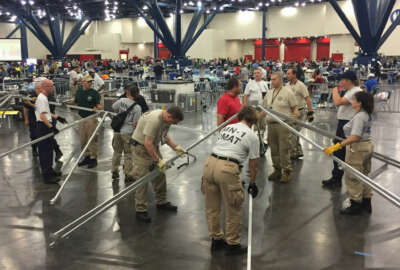As the remnants from Hurricane Harvey continue to mess with Texas, the question of how much government relief is warranted for repairs is again being raised.
The Office of Inspector General within the Department of Homeland Security (DHS) continues to challenge a $2 billion relief fund granted to the city of New Orleans after the devastating effects of Hurricane Katrina.
While 13 years have passed since Katrina hit the Louisiana coast, funds are still being allocated to infrastructure repair. These grants are being used for improvements that the inspector general, John Roth, said weren’t caused by the storm.
“FEMA has the responsibility to distribute money and help communities, but only as a result of storms,” Roth said on Federal Drive with Tom Temin. “The infrastructure that we’re talking about, which is largely the water supply lines in New Orleans, were very old and [already] on the verge of breaking down at the time of those storms.”
Under the Stafford Disaster Relief and Emergency Assistance Act, states and localities are required to keep their systems maintained in order to stay prepared should a natural disaster occur.
One-third of the New Orleans water system was over 100 years old, one-third was more than 40 years and only one-third consisted of updated, modern infrastructure, according to Roth.
“Over half of it had extended, or had exceeded, its useful life [and] should have been replaced during a normal infrastructure improvement program,” Roth said. “[And] New Orleans didn’t have anything like that.”
The inspector general also referred to a report New Orleans authorities conducted in 2004, a year before Katrina hit. The financial statement showed that the city recognized the need to invest at least $1.9 billion into capital improvements over a five year span.
“They didn’t have the money to do it and… the result is an old and very leaky system,” Roth said.
DHS did not question the need for infrastructure repairs after the storm hit. Instead, it placed heavy scrutiny on the causation behind the $2 billion grant obligated to the city for those repairs. Roth said the damage was caused more by the age of the infrastructure than the storm itself.
“Our challenge was really the fact that [the damage] wasn’t caused by the storm, and that the system was not maintained,” Roth said. “It should have been able to survive the storm had it been well maintained.”
FEMA obligates typically about $10 billion per year to storm relief. The amount granted for the affects of Hurricane Katrina was nearly 20 percent of what they obligate on average annually.
Roth said the reason why the causation wasn’t taken into account before the grant was established was due to the lack of internal authorization. The regional administrator had all the control.
“A $2 billion acquisition [should] have had a number of different reviews done by independent parties to ensure that in fact the acquisition was well-founded, that it was on course, that they had the correct documentation [and] that they had done the analysis,” Roth said.
The position for an acquisition leader to ensure the above process is completed has since been filled.
“DHS has done a very good job over the course of the last four years getting their acquisition management in place,” he said.
The audit completed by Roth’s office was the result of a whistleblower coming forward.
“There was an individual who did not believe this was a wise investment of taxpayer money [and] that [it] didn’t comply with the Stafford Act and was able to give us a call.”
Only $500 million of the obligated funds have been spent. Roth’s office published a report on July 24 outlining the reasons behind its challenge of the original grant and remaining funds.
The main recommendation is that FEMA drop the funds completely. DHS also pushed for a sufficient internal control system and department-level oversight to ensure that grants are consistent with the statute and FEMA’s obligation to the federal taxpayer.
FEMA did not agree with Roth’s conclusion. A response not entirely unexpected, according to Roth. He suspects that the rest of the funds will be used unless more action is taken.
“I will note that FEMA has a long history of disregarding our recommendations when it comes to question cost,” Roth said. “Unless we can get some attention either from the [Department of Homeland Security] or from Congress, that’s what I am afraid is going to happen here.”
Copyright
© 2024 Federal News Network. All rights reserved. This website is not intended for users located within the European Economic Area.
